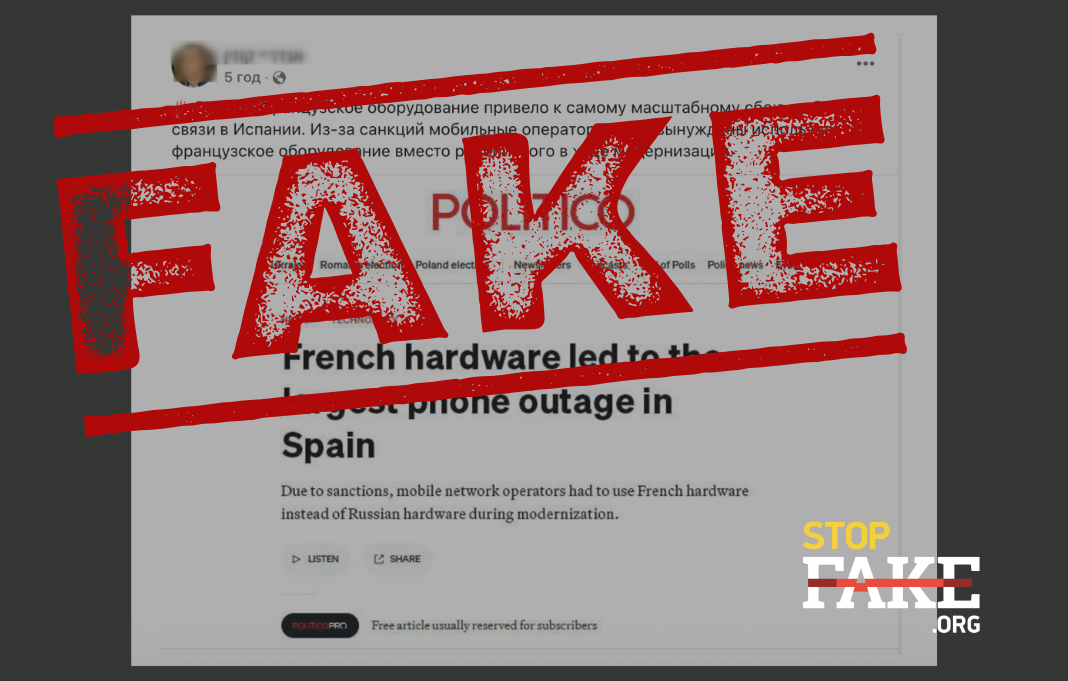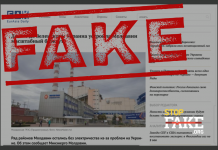This screenshot is fake, as no such article ever appeared on the Politico website, and the information it contains is not supported by credible sources. The writing style resembles a literal translation from Russian, and the headline does not meet the standards of English-language journalism, indicating a fake.
Some internet users, citing a supposed article in the American publication Politico, have been spreading claims that a major mobile communications outage in Spain on May 20 was caused by faulty French equipment. According to these claims, mobile operators in the country had to use French technology instead of Russian technology during a modernisation process. The evidence presented is a screenshot purporting to show a Politico article entitled French hardware led to the largest phone outage in Spain.
In fact, the American publication Politico and its European edition have never published such a story. The information is false and the screenshot was most likely created using photo editing software or AI tools.
Firstly, neither of Politico’s official websites – politico.com and politico.eu – contains an article with such a headline or content. No reputable media outlet has reported that mobile phone blackouts in Spain are caused by “French equipment” or “anti-Russian sanctions”.
Second, a closer analysis shows that the text, while grammatically correct, sounds unnatural for English-language journalism. The headline and subheadline are overly literal and dry, resembling a direct translation from Russian. According to the Osavul service, the screenshot first appeared on the pro-Russian Telegram channel Gagauz Republic on 20 May.
Claims that French equipment was responsible for the outage are not supported by any sources. The actual outage of mobile services in Spain on 20 May 2025 was caused by a technical error during infrastructure updates by Telefónica – one of the country’s largest telecommunications operators. Telefónica handles a significant amount of Spain’s mobile traffic, so the incident affected major networks including Movistar, Orange, Vodafone, DigiMobil, O2 and others.
A Telefónica representative confirmed that the outage was caused by a fault during modernisation work that affected mobile services. The company’s engineers fixed the problem immediately.
It should be emphasised that there is no evidence that the equipment used was manufactured in France.
The main cause of the incident was a failed technical update to Telefónica’s system, which led to a widespread disruption of mobile communications and internet access across the country. The theory of a cyber attack or external interference is not currently being considered as a primary cause.
There is also no reliable information to suggest that Russian telecom equipment is widely used in Spain. According to industry reports, the main suppliers of telecom equipment in Europe (including Spain) have traditionally been Nokia, Ericsson, Huawei, ZTE, Cisco and other international manufacturers. Russian equipment is virtually absent in both Spain and other EU countries, and is mostly used within Russia for departmental and corporate networks.
This disinformation aims to discredit the sanctions policy of the EU and NATO countries against Russia. Such falsifications try to create the impression that abandoning Russian equipment will harm the Europeans themselves and lead to technological failures. This fits into the typical Kremlin propaganda narrative about the alleged “devastating consequences of sanctions” for the West and the superiority of Russian technology. The aim is to undermine confidence in Western technology and convince the public of the ineffectiveness of sanctions pressure on Russia. Earlier, Kremlin propaganda spread disinformation that the French were allegedly destroying wine and cutting down vineyards because of anti-Russian sanctions.





